‘They’re getting tough on humanitarian aid workers’
How Harrison Silver and his mates get aid to where it’s needed.
Networking and logistics are everything in the aid community, and this becomes more and more challenging the closer you get to the front line, with all the chaos and security concerns that involves. Sometimes the state and its representatives appreciate and facilitate aid work, but often unfortunately often they do not, particularly those who are themselves located far from danger.
I’d met Harrison of Ukraine Mission CIC when he and Pieter came around to the UAU base for a barbeque a couple of nights after I interviewed Pieter. Harrison was initially not keen on the idea of talking about his experiences but warmed up after reading some of my posts.
So, Harrison Silver, what brings you to Ukraine?
Well, me and two friends – Rhys and Beth – decided a few weeks into the war that we just wanted to help. Unlike other conflicts and disasters, this was less than two days’ drive away, so a few days later we were in the pub and I said, let’s just go! Two weeks after that, we were on our way.
It was the perfect time for me to take a break from my job, and do this for a few months. So I just shut down my landscaping business even though I was booked up for about two years. I had some unhappy customers! I decided I was going to go out and spend two or three months until I ran out of personal money, then come back… then I didn’t leave for a year. I think last year I was in England for two months in total, maybe a bit less.
At the start, we were mostly doing things for civilians, so I had tonnes of food, diapers, coats, all that sort of stuff, in two overloaded vehicles. We did a trip, and then another one. We spent time in hospitals and realised this crisis was much bigger than what you’re seeing on the news, it was on a massive scale.
And now, I don’t think I could go home. I don’t think I could stop.
You’ve moved on a lot from those early days?
Yeah, we’ve developed from doing all the diapers and food. Those are available in-country now. We specialise in medical equipment which Richard, a paramedic in the UK who works with us, can get for a fraction of the normal cost. Grant and Andrew have sourced a lot of fire equipment and kit, too, so we’ve provided close to a thousand fire service uniforms.
But the main thing at the moment is the medical. I’m moving towards helping the smaller pop-up hospitals and stabilisation points [small clinics near the front line where wounded soldiers receive initial emergency treatment]. We try to get the equipment, service it and also get all the consumables, so the day I drop it off, it’s being used. If we had funding it would be a lot easier, but we go with what we can get hold of.
There are trusted people that I work with in country, who talk directly to the soldiers or doctors. Like, last night I got a call that a [military] unit is moving and their stab point has been hit, and they need a list of kit; patient monitoring, cardiac monitoring, some oxygen tanks, maybe a defibrillator. I had a defibrillator with me, and the rest of it I bought on auction last night while I was in bed, for not very much.
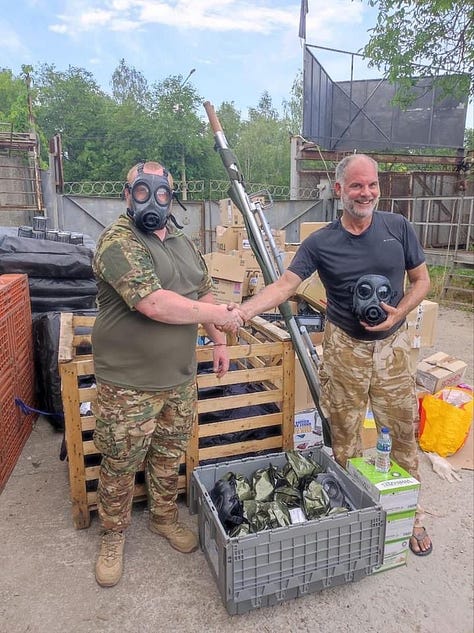
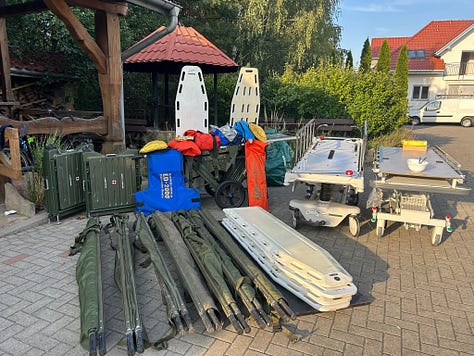
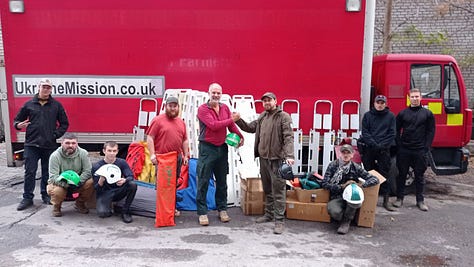
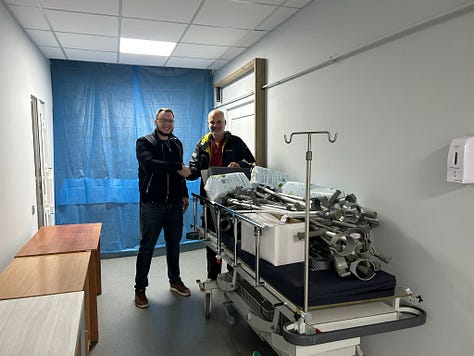
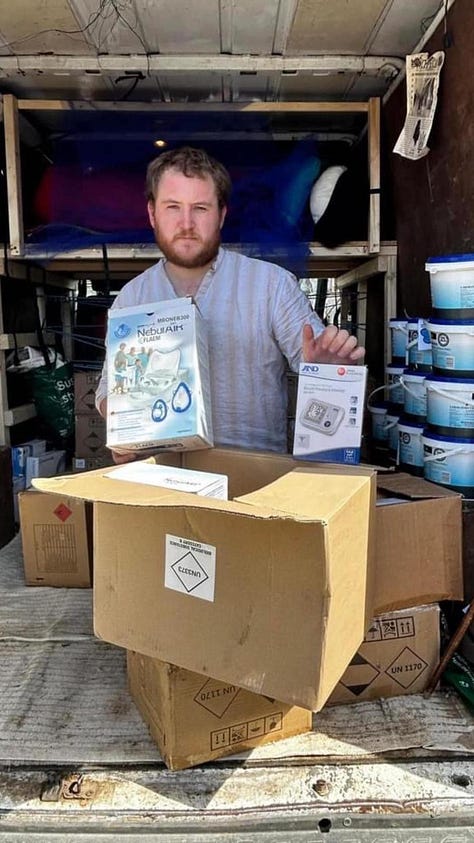
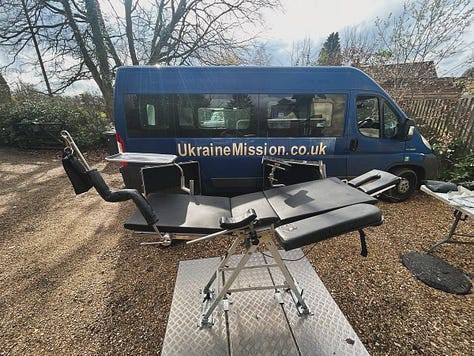
Tell me about some of the people you work with.
We work with a guy called Ivan who’s based in Zaporizhzhia. His day job is as an ambulance driver, but his charity, which I don’t know how to pronounce [Vognuk], has a Soviet-era bomb shelter underneath the city which they use to train the local population and the police and fire service on how to deal with new situations, and how to use the equipment we’re dropping off.
We show him what we’ve got, and he knows how to use most of it, and what he doesn’t know we can show him. Then we can leave him a hundred spinal scoops or infusion machines or whatever, and he’ll get people to come to him, he won’t just give it out randomly. He’s the type of individual we want to support. We’ve given him a couple of vehicles and we’re going to fundraise to get a little four-wheel-drive for a friend of his, a doctor who is currently hitching rides with soldiers to get to stabilisation points.
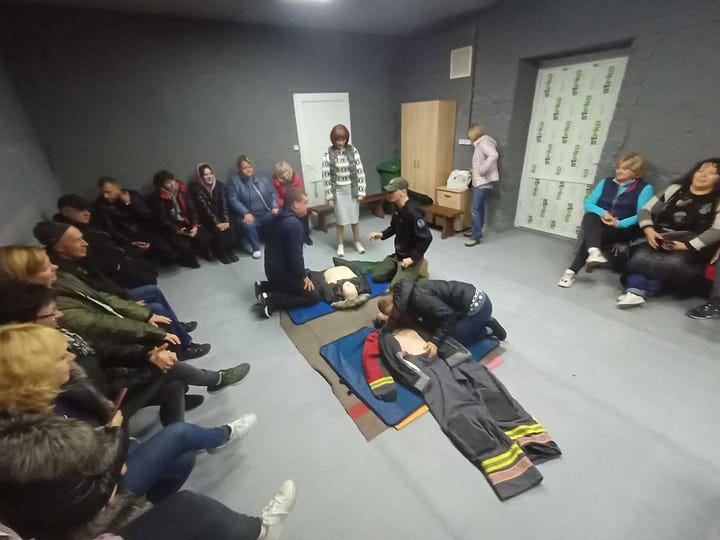
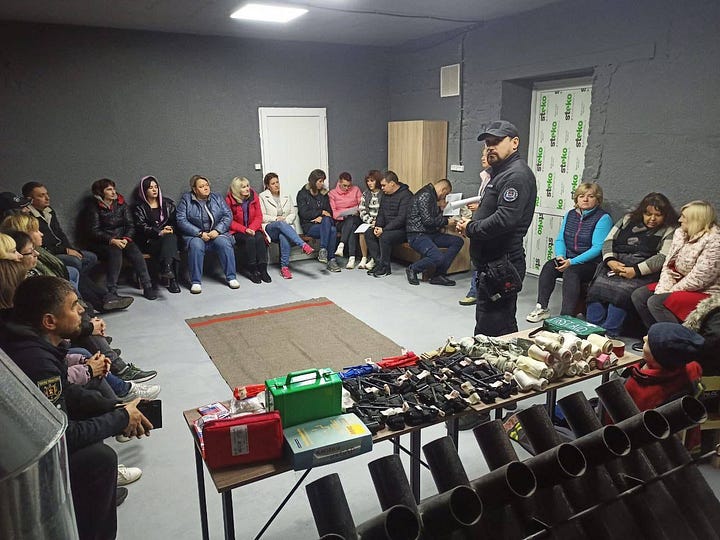
We met Pieter when he was working with a Dutch charity in Krakow. We separated from them because of certain issues, but we could see that Peter just wants to help. I liked him on a personal level and we did a trip together.
He ended up buying his own stuff; I think he got 700 stretchers in one go from an auction in Austria at a very low cost. He’s based here, and happy to find local contacts and network, and I can just show up with my van, knowing where everything on the van is going. And he’s got a car too. Sometimes you can’t take a truck or a big van to the dangerous areas where they need it the most.
It's important to have local contacts. Sometimes I ask people at hospitals what they want, and I get a vague answer until they realise you’re actually real, and actually providing what they want. Sometimes the problem is that there’s just one guy at the hospital who speaks English, and they’re just like yes yes yes yes yes yes yes to everything I’m offering. Then I drive 3,000 miles to eastern Ukraine, and open up the van, and they pick through it and don’t want everything. But I’ve got so many contacts now, if one person won’t take it, someone else will.
You supply a lot to the military?
We're doing hospitals and stabilisation points, which provide aid for everyone. The harsh reality is, if you want to help the people of Ukraine, you've got to help the military. And if you want to even help civilians in the areas where civilians need help, you have to work with the military, or you won't get there. You won't get past the checkpoint.
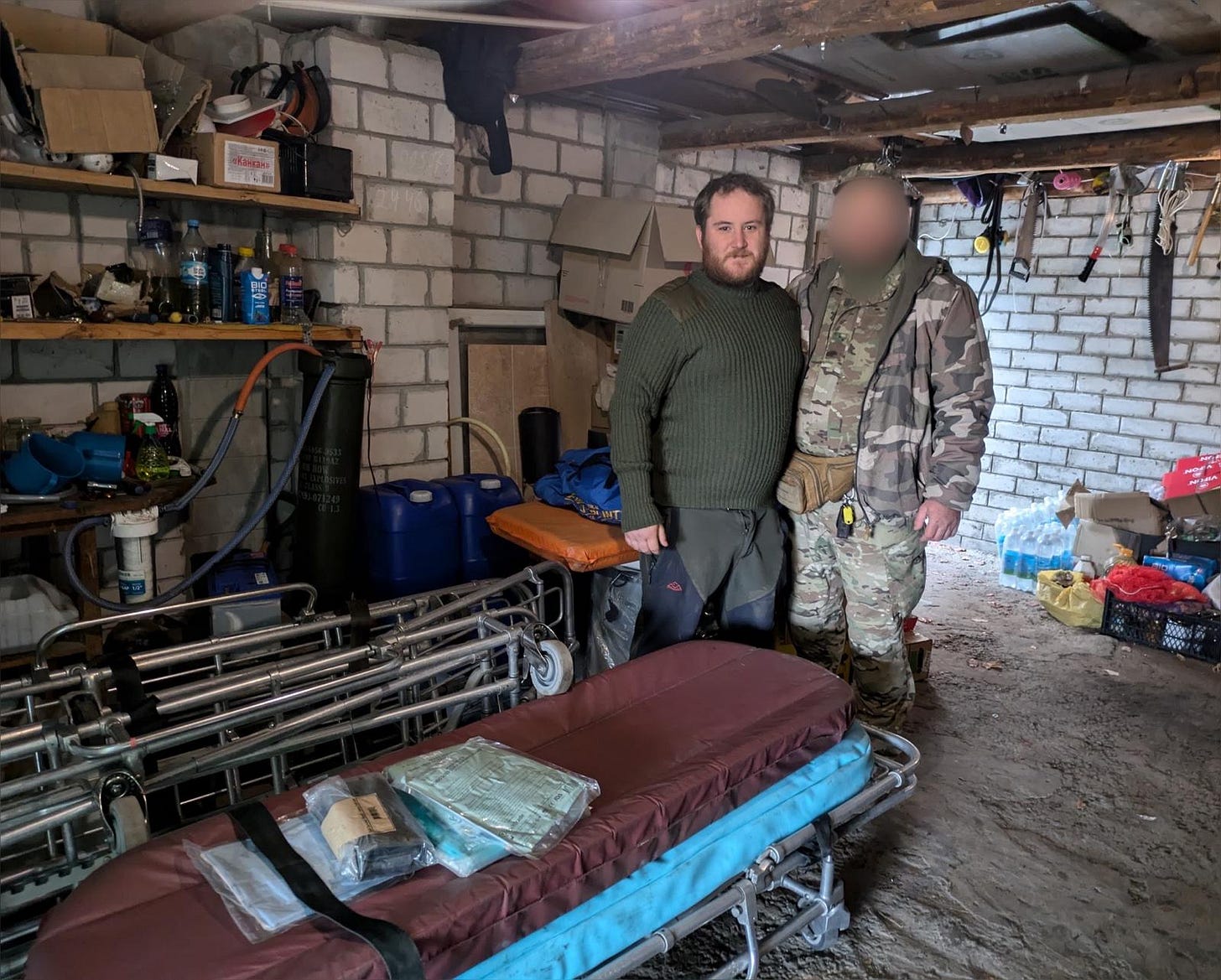
I particularly wanted to ask you about your experience with border crossings. If people at home think about it at all, they assume that once the aid is loaded onto a lorry, it’s as good as arrived in Ukraine. In reality, everyone I know who transports aid has horror stories about the border.
Yeah. Well, early on it was a lot easier. You’d show up at the border with Poland and tell them what you’re doing, and they would sign your paperwork and off you go. Then early this year a new electronic system came into play. There was a lot of hysteria about it, that it was going to end aid. And it has squashed some of the small people. But at that point I’d built up the contacts, and we quickly learned how to get the paperwork done, and worked with Ukrainian charities to do it.
The real problem with the new system, which isn’t talked about too much, is in-country where we have to sign over the stuff to a charity or the military. Once someone’s signed for it, I can hand it out to who I want, but the problem is people don’t want to sign for it, especially the military. They really get in trouble if stuff disappears. For example, we recently handed out patient monitors to a medical unit and saw that the ones they had were wrapped in bright yellow tape. We asked why, and it was in case the stab point gets blown up, in which case their biggest concern is making sure they find those units.
Additional context: The new (as of January 2024) system is designed to tackle corruption by verifying that aid entering the county is going to an appropriate destination, and won’t just mysteriously evaporate. However, smaller organisations seldom have a large shipment of specific items that can be handed over to a named contact at a single organisation. Zaporizhzhia Radio Resistance, for example, collects second-hand computers and phones that are handed over to individual recipients direct. In spite of being the most efficient means of operation, this is viewed by the bureaucracy as suspicious. The last boxes I dispatched for them were delayed at the border for months and I’m relieved they didn’t disappear entirely. In March I travelled here with my hand baggage rammed full of laptops and phones.
As for problems at the border, they’re getting tough on humanitarian aid workers, and they’re quite suspicious of me for the amount of times I’ve crossed the border. They ask me, are you selling the aid? And I’m like no, of course not. Then, how are you living? I’ve got my own savings and my fuel is covered by the charity, but I can see why they would be suspicious. Sometimes I’m bringing in up to half a million pounds worth of medical equipment in the back of a van, which we haven’t paid much for.
But I also feel like they’re picking on us. And I have a lot of problems trying to leave as well. It used to be maybe once in every five times they’d do some sort of extra check, and now it’s pretty much every time I go to the border. They’re taking me to X-ray, they get the dogs in. It turns a two- or three-hour experience into a seven-hour ordeal, after I’ve been sleeping in my van for days. Occasionally we get a hotel so I can have a shower and get changed, but if we’re short for time sometimes we’re driving up to 20 hours a day. Then you get stuck at the border, the bleakest place on earth.
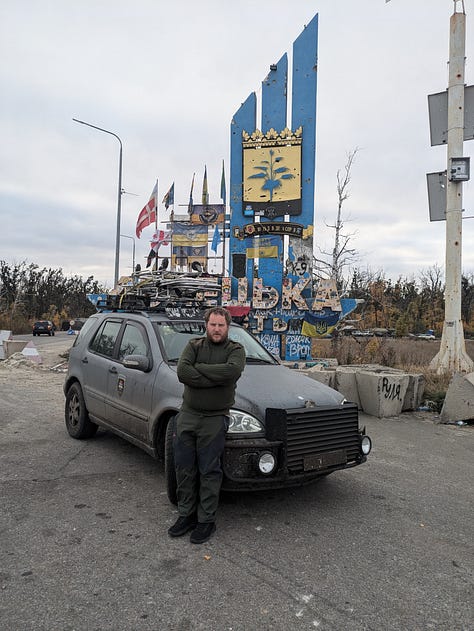
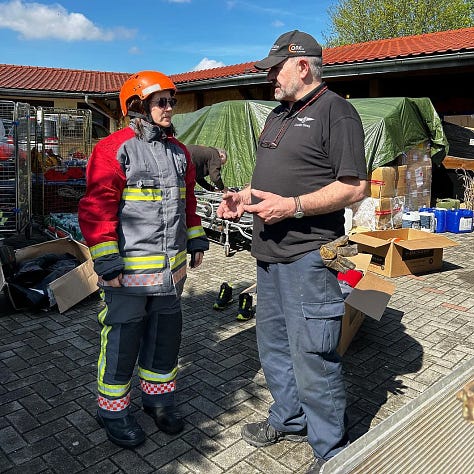
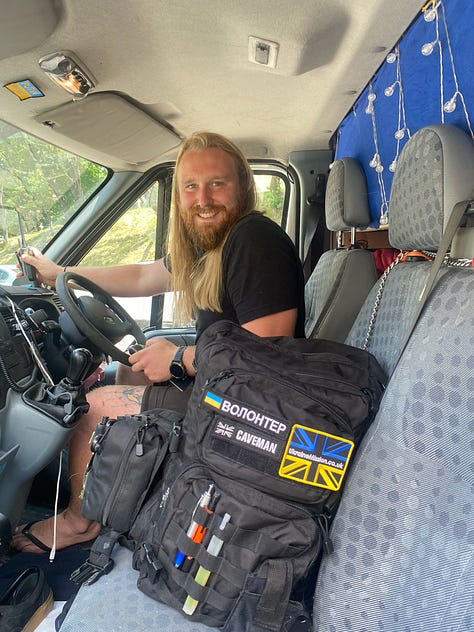
Can you give me a specific example of a problem on the border?
I stupidly overstayed in Europe. I was lucky, because I was supposed to be deported [home] from Poland, but ended up getting pushed back into Ukraine. There, I had a guy who could fix me a visa for Ukraine, inside Ukraine, but unfortunately he had an accident and couldn’t do it. I was just told it was going to be sorted and I’d get a piece of paper, but that never happened. And when I eventually came to leave just before Christmas last year, I just needed to get out because I’d been here for three or four months, as well as the times I’d been in before. So I ended up overstaying here as well.
[When I tried to leave] I showed them what I’d been up to, dropping off ambulances. I’d dropped off an ambulance the time I got caught for overstaying in Europe. So I showed them proof of where I’d been and they were like, well, we’re not banning you, but you have to pay a fine. It wasn’t much, fifty quid or something. I tried to pay in cash, which they wouldn’t accept, which is a good thing, I guess. But I paid it and didn’t get a receipt.
Then once I got back to England, I paid it two more times. I ended up paying it three times in total, didn’t get any confirmation. I figured it was fine.
I fixed my problems with Europe and got my lovely new passport. Because the old one was full of stamps going in and out of Ukraine. And I came back, again bringing a 4x4 ambulance for a rescue worker in Zaporizhzhia… and big no-no at the border. I got a big, massive red stamp on the back of my passport. Banned for three years.
I’d paid the fine. They could see that I’d paid the fine. But what they’d neglected to tell me was that, despite the fact that it’s an international border, it needs to be paid by a Ukrainian bank account. Which makes little sense. Aid workers are hindered by stupid bureaucracy that should just be lifted.
How was that situation resolved?
Well, I called up a lot of people. I quickly realised it wasn't going to be a quick fix, I couldn't fix it at the border. And at this point, I'd pretty much had enough. Because I'm giving everything, giving everything to help. People that need the help, really need the help. And then you've got these people at the border, that just seem to not give a shit, questioning why you're there. Like, ‘Why are you here?!’ is the real question.
But I had some people I could call. People connected to the Polish government. Some commanders in the Ukrainian army. And some other somewhat influential people that I've worked with. Local governors to write letters and stuff like this for me. But it was going to take time. And I ended up contacting someone I worked with early on. Someone who let me stay at their house when there was no power and no phone service because of the Russian bombings. A lady called Inge who runs a little dog charity and does some amazing work for animals. She called up the border and shouted down the phone, ‘How dare you do this to someone?!’
And that’s how it got fixed. Though she did have to pay the fine again, from her bank, even though they’d already had it three times.
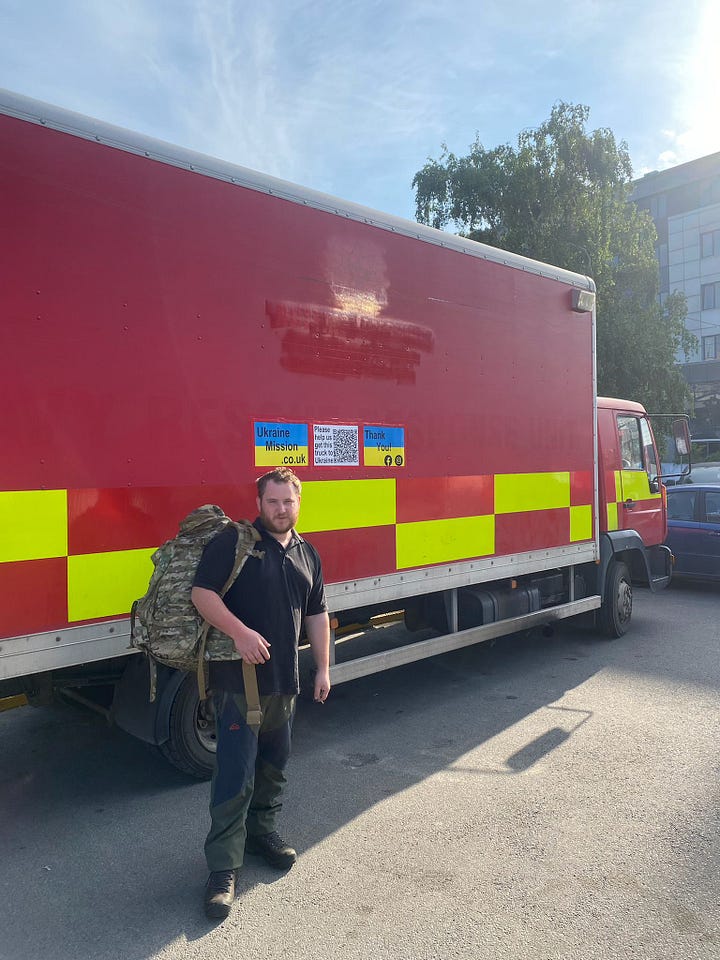
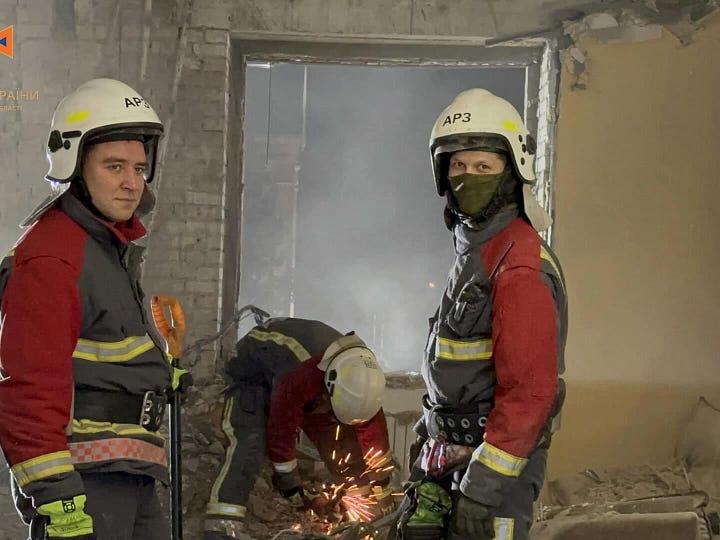
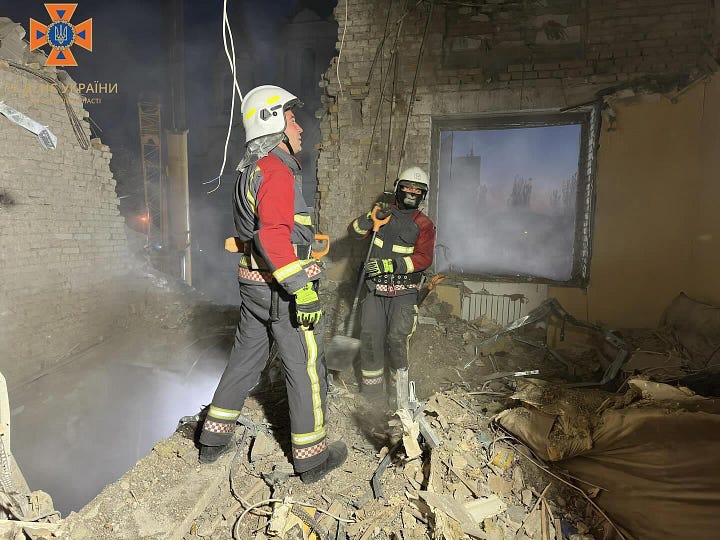
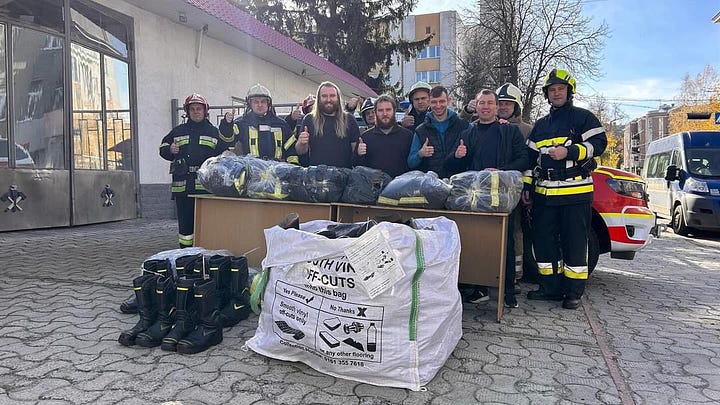
That’s a really good story… but it probably wasn’t fun at the time.
Yeah… but for me, it’s leaving the country that’s the problem. Coming in, I’ve got the right documents but leaving, you know… It’s just massively demoralising and there should be a system in place, maybe even a separate border crossing for aid, to streamline it, but there isn’t, it’s all ad hoc. We recently got stuck at the border for nine hours trying to bring in a truck that’s being donated to a fire service. Two volunteer drivers stuck at the border for nine hours with me sitting in a car. Yeah… the thing that makes me think about stopping doing this is that they’re so critical of what I’m doing for free. Other groups moan about the bureaucracy, and I don’t really have a problem with that, because we know what we’re doing and we work for some good charities but, you know, you wait in a queue to get to the border sometimes, and then it becomes a seven-hour ordeal and you just want to go to bed. We’ve had people stuck at the border for 13 hours, sleeping at the border because one thing on the paperwork done by the Ukrainian recipient was wrong.
But so far it’s been worth it?
Yeah… Some of the nicer stuff is getting messages or even calls from Ukrainian medics or officials, or just regular guys telling me that, you know, I've lost my leg, but you saved my life. Yeah, that's what you're there for. Gives me shivers to think about it.
Great! Is there anything else you would like to say?
Slava Ukraini!

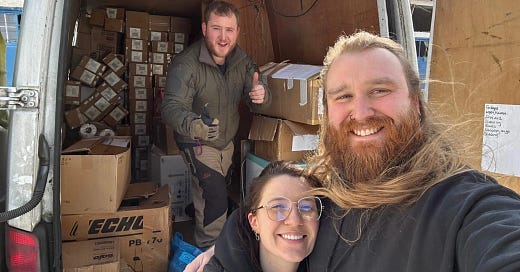




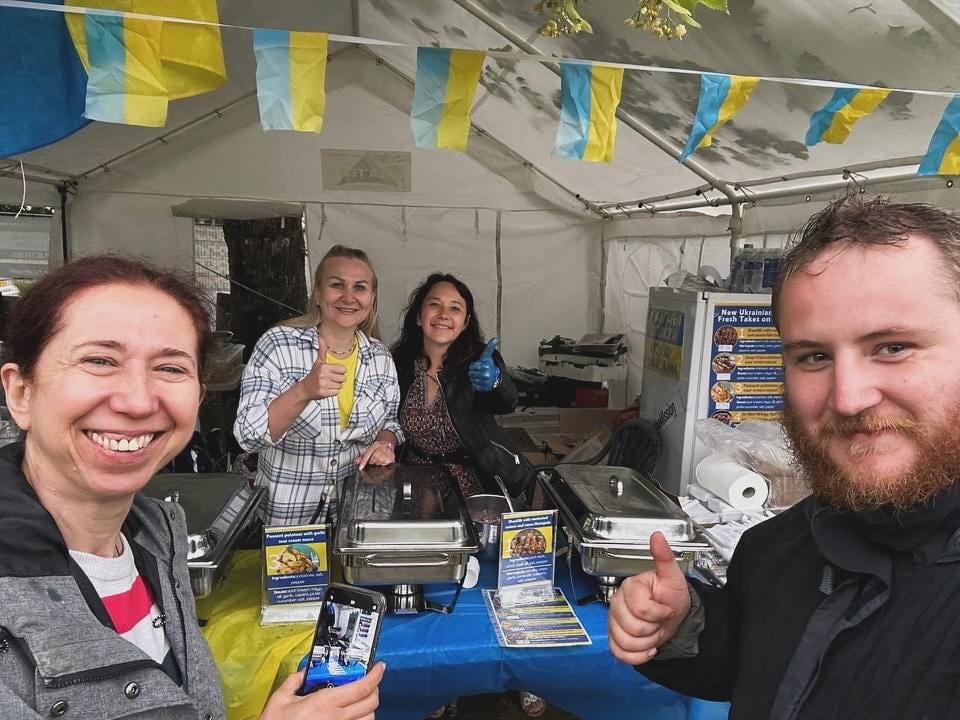

Sad, sad situation but reading about real people being real makes the idea of all of us slipping into a dystopian future less depressing. Thanks again. Great post.
I wouldn’t hear these important stories if it wasn’t for your substack. Thanks for what you do and thanks for writing about it.